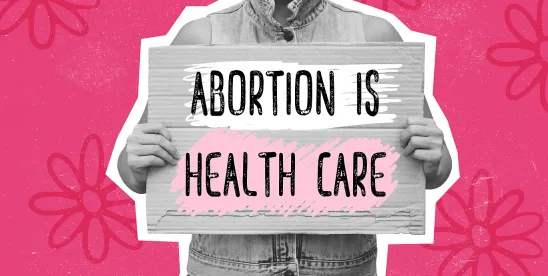Over two years into the post-Dobbs era, women’s health is taking center stage in the presidential election. In Dobbs v. Jackson, the Supreme Court overturned protections relating to abortion established in Roe v. Wade. Since then, approximately half of the states across the country have enacted or revived laws that ban or significantly restrict access to abortion. This case and the resulting cascade of legal disputes and legislative battles have created a highly dynamic and precarious legal landscape for women’s health. As a result, providers are left uncertain of their rights and obligations. Women in anti-abortion states face challenges obtaining reproductive care and, if pregnant, other medical treatments unrelated to reproductive care, while hospitals and clinics in nearby states without such restrictions are grappling with overwhelming patient loads.
In vying for American votes, the Democratic and Republican parties have offered very different visions for women’s health. Former President Donald Trump has indicated he supports the Supreme Court’s decision in Dobbs v. Jackson, favoring strict anti-abortion laws and arguing that abortion laws should be left to the states. By contrast, Vice President Kamala Harris is strongly opposed to the Dobbs decision and would seek to return to the protections previously offered by Roe v. Wade. Each candidate is expected to flex the powers and authority of the federal government to the greatest extent they can in order to further their agenda on this important issue should they be elected.
In this article, we will discuss the candidates’ positions on abortion and related issues, and how those positions impact the state of women’s health more broadly.

An Overview of Each Candidate’s Position
A Trump administration is likely to use the levers of the federal government to restrict or eliminate, and/or protect states’ rights to restrict or eliminate, access to abortion, relax requirements around health insurance coverage for reproductive care, place restrictions relating to abortion on Medicaid funding, and diminish the protective framework of HIPAA, particularly with regard to reproductive health information.
By contrast, under a Harris administration, the levers of the federal government would be flexed to expand women’s right and access to abortion, adopt federal protection for fertility treatments such as in vitro fertilization (“IVF”) and contraception, expand governmental health programs to protect women’s health, and strengthen federal protections on patient health information under HIPAA for women using digital health apps.
| In a Trump Administration… | In a Harris Administration… | |
| Federal Law | Potential for a national abortion ban Likely no federal law protecting IVF or contraception | Potential for national law codifying Roe v. Wade and/or protecting IVF and contraception |
| FDA Authority | Potential roll back of FDA approvals re mifepristoneUnlikely to defend FDA modifications to mifepristone approvals in 2016 and 2021 if challenged again in the courts | Likely to defend and protect FDA authority re mifepristone, including 2016 and 2021 modifications to ease requirements |
| Insurance Coverage | May seek to reinstate and expand 2018 Association Health Plan (AHP) rule, eliminating requirement of covering essential health benefitsMay seek to expand exemptions for employers refusing to cover contraception on religious or moral grounds | Likely to tighten AHP regulations and defend comprehensive coverageWill seek to preserve contraceptive coverage under the ACA |
| Telehealth | Likely to impose restrictions on telemedicine for reproductive health services, such as medication abortion, reinstating rules that require in-person visits | Likely to make telehealth expansions permanent, including access to reproductive care, with a focus on equity and reducing barriers for underserved women |
| HIPAA | Likely to issue guidance or regulations that permit states to use PHI for enforcement of anti-abortion laws | Likely to extend privacy protections for PHI related to contraception, abortion, and fertility treatments and data stored on health apps and in medical records |
| Medicaid | May restrict access to funding for states with permissive abortion lawsLikely to oppose expansion of Medicaid funding to cover reproductive health services | May restrict access to funding for states with restrictive anti-abortion lawsLikely to advocate for comprehensive reproductive health services under Medicaid, including family planning and abortion access. |
| Other Federal Funding | Likely to re-implement Title X Gag Rule, which previously blocked clinics that provide abortion referrals from receiving federal funding | Likely to increase funding for Title X and eliminate restrictions on referrals for abortion services |
A Deeper Dive into the Key Issues Heading into the Election
Federal Abortion Legislation
A central question is whether either candidate will seek to impose a national abortion law.
While early indicators suggested the Republican party would aim to enact a national abortion ban, the party has since distanced itself from that position, citing its desire to leave the decision to the states. Whether this shift reflects an actual change in policy or a short-term strategy to appeal to the broader voter population ahead of the presidential election remains to be seen. By contrast, Harris has stated in more certain terms that she will sign federal legislation codifying the rights and protections of Roe v. Wade.
Regardless of which candidate wins the election, their ability to enact federal legislation will depend on whether their party also controls the House and the Senate and to what degree. A razor-thin majority may not be sufficient to adopt such ambitious legislation.
Mifepristone
Short of federal legislation, there are many other avenues available to the candidates to ease or restrict access to abortion. One key lever will be easing or restricting, as the case may be, women’s access to abortion medications that can be taken at home, such as mifepristone.
Mifepristone, a drug used in combination with misoprostol to terminate pregnancies during the first 10 weeks, has become a focal point in the broader conflict over abortion rights. Initially approved by the United States Food and Drug Administration (“FDA”) in 2000, mifepristone has been used safely by millions of women. However, its role in medication abortion has made it a target for anti-abortion advocates, leading to lawsuits and regulatory challenges. Indeed, the Supreme Court’s ruling earlier this summer in FDA v. Alliance for Hippocratic Medicine marked a significant moment for both abortion access and the broader regulatory powers of federal agencies and further positioned reproductive rights as a defining issue in the upcoming election season. (Click here for additional coverage of this case).
A Trump administration might appoint a new commissioner who would seek to roll back the FDA’s approval of mifepristone to its 2000 approval, eliminating the more recent relaxation of requirements that the FDA adopted in 2016 and 2021, as seen in recent legal challenges. The FDA could enforce stringent distribution rules, rescind the mail-order option, or impose in-person medical appointments and similar requirements. Alternatively, as the Supreme Court left open the door to future challenges where standing could be established, the Trump administration could simply choose not to defend the FDA’s 2016 and 2021 approvals in future legal challenges.
Conversely, under a Democratic administration, we can expect continued efforts to protect access to abortion medications, despite the increasing number of state-level restrictions, and staunch defense of the FDA 2016 and 2021 actions. Harris could, like President Biden, utilize executive powers to enforce FDA regulations and staunchly defend the FDA in lawsuits involving state-imposed limitations or criminalization of the distribution of abortion medications under the principle of federal supremacy.
Association Health Plans
A second Trump presidency would likely revive and expand previous efforts to deregulate Association Health Plans (“AHPs”). Trump’s 2018 rulemaking allowed more small businesses and self-employed individuals to band together and offer health plans that skirted many of the Affordable Care Act’s (“ACA”) mandates, such as covering essential health benefits, including maternal care services. Further, by encouraging the formation of AHPs, Trump’s policies could lead to greater segmentation of the health insurance market under a phenomenon known as adverse selection. As healthier individuals gravitate towards AHPs, traditional plans are left with a greater concentration of high-risk individuals. This in turn leads to increased medical costs, and, consequently, higher premiums that disproportionately impact women, who frequently require essential health services such as maternity care, contraceptive services, and preventive screenings. When faced with higher costs, women are more likely to postpone or forego these vital screenings and treatments, ultimately jeopardizing their long-term health and well-being.
By contrast, a Harris presidency is likely to support stronger regulations for AHPs to ensure that they meet essential health benefits and consumer protections, similar to those under the ACA. This could include ensuring comprehensive coverage, including preventive services and maternity care, limiting the ability of AHPs to discriminate against individuals with pre-existing conditions, and making AHPs more accessible to marginalized communities.
In Vitro Fertilization
Earlier this year, we highlighted the Alabama State Legislature’s passage of SB 159 as a means of granting certain protections to IVF clinics and providers in the wake of the LePage v. Center for Reproductive Medicine decision. While this legislation quelled an immediate threat to fertility treatments in Alabama, it does not prevent other states from adopting the same broad definition of personhood as adopted in LePage.
In recent months, IVF has emerged as a prominent topic in both congressional chambers. On September 17, 2024, the Senate considered a bill that would have protected access to IVF and required public and private insurance coverage of IVF and other fertility treatments. However, Senate Republicans blocked the bill on the grounds that it was unnecessary and overly broad.
Both Trump and Harris have expressed support for IVF generally, but with different approaches. For example, in August, Former President Trump stated that he would support a federal law with a provision requiring insurance companies to pay for IVF, despite his party’s opposition. In the same month, he also expressed support for free IVF treatment. Additionally, during the September presidential debate, Trump emphasized that he had been a leader on IVF, despite once supporting a national ban on IVF that would have made the treatment illegal. As his position shifts, he is met with opposition from anti-abortion groups and individuals due to the fact that IVF can involve the disposal of embryos. Should he win the election, his administration is likely to face mounting pressure to adopt restrictions or even an outright ban on IVF.
Harris has taken a more consistent position that IVF access must be protected as a part of an overall effort to protect reproductive freedom. In a statement she made following the failure of the previously-mentioned IVF bill in the United States Senate, Harris expressed that she stands with Americans who support protecting access to fertility treatments. She also called on Congress to enact legislation that restores reproductive freedom.
* * *
As we approach the first presidential election since the overturning of Roe v. Wade, the future of reproductive health care is at a critical juncture. While the specific outcomes remain to be seen, one thing is abundantly clear: reproductive rights have emerged as a galvanizing issue for voters across the political spectrum. The heightened voter engagement will not only shape the electoral landscape but also signal to policymakers the critical importance of addressing this issue in the years ahead. The stakes are high, and the implications of this election will resonate far beyond the ballot box.
* * *
The law, policy and regulatory climate surrounding the Dobbs decision is complex and quickly developing. The information included in this article is current as of writing, but it does not address all potential legal issues or jurisdictional differences, and the information presented may no longer be current. Readers should consult counsel regarding their specific situation.





 />i
/>i
